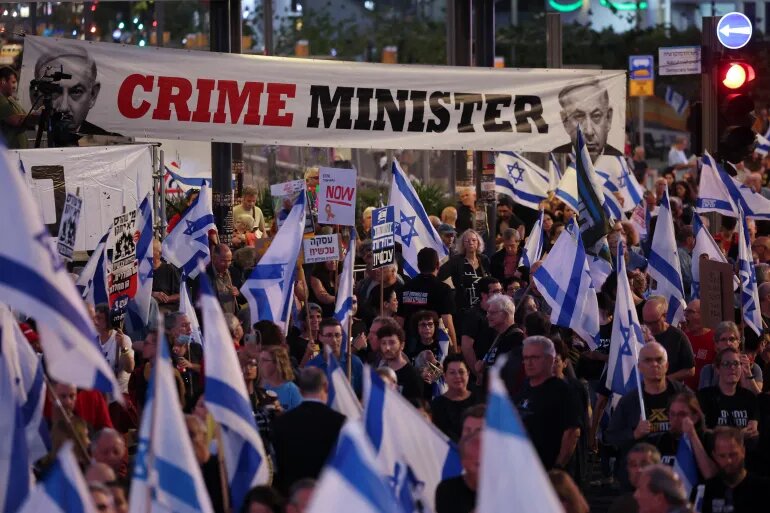Israeli polls show captive deal a priority over war
Settlers increasingly pessimistic over the future of “Israel”

TEHRAN- Surveys conducted by Israeli research groups reveal that the majority of the Israeli population are in favor of a deal to release captives over the ongoing military action in Gaza.
The polls also show a decreased level of confidence in achieving victory in the enclave where the Israeli military is pounding the southern city of Rafah and fighting again in the north.
In the northern district of Zeitoun, Israeli forces are attacking the region for the third time since October 7.
Israeli Prime Minister Benjamin Netanyahu has vowed to press ahead with the genocidal Israeli war on Gaza until “total victory” despite Tel Aviv’s Western allies saying the continuation of the war that has killed over 35,000 people, mostly women and children, will fail to achieve any victory against Hamas but rather will strengthen the resistance movement.
The parents of nearly 1,000 Israeli troops deployed in Gaza have penned a letter urging their military to call off a “reckless” ground offensive in Rafah, calling it a “deadly trap” for their children.
“Our sons are physically and mentally exhausted,” the letter said.
The “Israeli Democracy Institute” affirmed that “the majority of Israelis consider the prisoner swap as their priority over military action in Rafah.”
The Israeli army is expanding operations in the southernmost city crammed with one million displaced Palestinians despite the international alarm.
The Institute shows that 56 percent of Israelis believe a captive exchange deal should be the top priority for the Israeli government, while 37 percent said that military action in Rafah should be the top priority.
When it comes to political leanings, “a significant majority of the left (92.5 percent) and the center (78 percent) see the release of captives as the top priority. However, 55 percent of the Israeli right believe that military action in Rafah is the top priority. Yet, even among right-wing voters, there are significant divides.”
The Institute noted that Likud voters are split, with 48.5 percent prioritizing military action while 44 percent prioritize reaching an agreement for Israeli captives.
A separate poll conducted by Israeli Channel 13 revealed that 52 percent of respondents believe that “a large-scale operation in Rafah will not achieve complete victory,” and 44 percent believe Netanyahu is not interested in a deal to release captives.
Furthermore, 56 percent of Israelis say Netanyahu’s political survival is more important to him than any agreement.
Another survey by the Israeli Public Broadcasting Corporation found that nearly half of Israelis support a captive exchange deal involving the release of all Israeli captives in exchange for a complete end to the war and the release of thousands of Palestinian prisoners.
A survey by the Jewish People Policy Institute highlighted that Israelis are “less optimistic and less confident in victory.”
According to the research, there has been a significant decline in public optimism about “the future of Israel”, with a decrease in confidence also in the Israeli military’s ability to achieve victory in the war on Gaza.
The study found an unusual decrease in the percentage of Israelis confident in achieving victory, dropping from 74 percent in October to only 38 percent in early May.
Since January, there has been an erosion in Israeli optimism about the future of “Israel”, with only 63 percent expressing some degree of optimism, compared to 75 percent in January of this year.
The polls show a pattern of declining appetite among Israelis for war with every passing month. Support for military action in Gaza has been perpetually dropping since October when the overwhelming majority supported a war.
The decline can also be seen in the growing anti-war and anti-government protests on the streets of Tel Aviv.
